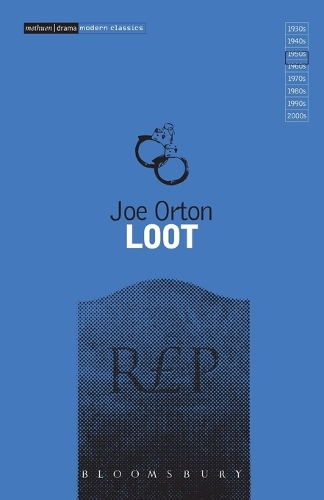
Loot
(Paperback, New edition)
Publishing Details
Loot
By (Author) Joe Orton
Bloomsbury Publishing PLC
Methuen Drama
1st August 2006
New edition
United Kingdom
Classifications
Professional and Scholarly
Non Fiction
822.912
Physical Properties
Paperback
96
Width 130mm, Height 196mm, Spine 6mm
114g
Description
A black farce masterpiece, Loot follows the fortunes of two young thieves, Hal and Dennis. Dennis is a hearse driver for an undertaker. They have robbed the bank next door to the funeral parlour and have returned to Hal's home to hide-out with the loot. Hal's mother has just died and the pair put the money in her coffin, hiding the body elsewhere in the house. With the arrival of Inspector Truscott, the thickened plot turns topsy-turvy. Playing with all the conventions of popular farce, Orton creates a world gone mad and examines in detail English attitudes at mid-century. The play has been called a Freudian nightmare, which sports with superstitions about death - and life. It is regularly produced in professional and amateur productions.
First produced in London in 1966, LOOT was hailed as "the most genuinely quick-witted, pungent and sprightly entertainment by a new, young British playwright for a decade" (Sunday Telegraph)
Author Bio
Joe Orton (1933-1967) was an English playwright noted for his black comedies, which combine genteel dialogue with violent and shocking action. Orton left home at 16 to train as an actor. His subversive style of humour first revealed itself in a bizarre incident in 1962, when he and his lover, Kenneth Halliwell were jailed for defacing library books. The two had carefully removed jacket blurbs from middle-brow novels and substituted their own, mostly scatological, counterfeits. Orton delighted in shocking audiences by breaking taboos surrounding sexuality and death in conventionally structured 'black' farces involving epigrammatic dialogue and frenetic, convoluted plots. Thus, in Entertaining Mr Sloane (1964), a young lodger attempts to lure a woman and her brother into providing him with all he needs, only to find he has become each one's sexual plaything; Loot (1965) is a parody of a detective story involving much comic business with a coffin and a corpse; and What the Butler Saw (1969) stylishly turns farce on its head. Orton was a homosexual in a period before the liberalization of British law, and this side of his life is described in detail in his posthumously published diaries. He was battered to death by Halliwell (who subsequently committed suicide) during a domestic argument at their home in Islington, North London.
